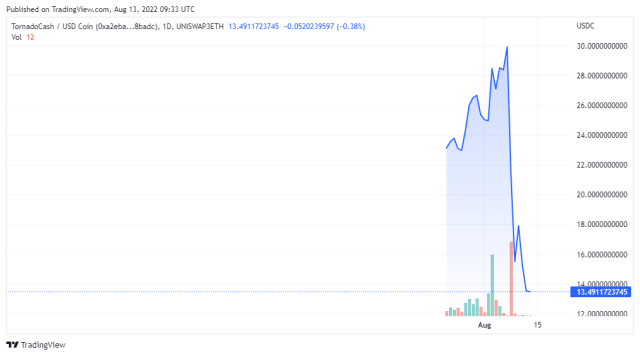
What’s the story around Tornado Cash? The U.S. Department of the Treasury made its case in a press release, but the question still lingers. Because, as many people have pointed out, Tornado Cash is not an institution. It’s a smart contract in the Ethereum blockchain and, according to US law, code is supposed to be speech. Are they challenging that? To make things even more suspicious, the Netherlands arrested an alleged Tornado Cash developer.
What is going on here? Was that man arrested just for writing code? How’s that possible? He didn’t launder that money himself… or did he? According to FIOD, the developer “is suspected of involvement in concealing criminal financial flows and facilitating money laundering through the mixing of cryptocurrencies through the decentralised Ethereum mixing service Tornado Cash.”
That could mean a number of things. Is there more to this story? Is the developer guilty of other crimes besides writing code? Or did the world’s authorities start an all-out war on privacy while we weren’t looking? Very few people are able to answer those questions at the moment. What we can do, though, is consult with the Twitterati and see what the general sentiment out there is.
Privacy Is A Human Right
- Stani Kulechov, the Aave Protocol CEO, schooled regulators about the justified and legal use of privacy tools. “This arrest makes all privacy/encryption developers a target. The worst part is people use privacy tools on a daily basis online, because the internet is an unsafe place without privacy or encryption.”
- Bankless’ Ryan Sean Adams broke it down to the essential. “They put a man in jail because bad people used his open source code. This cannot stand in any free society”
- Shape Shift’s Erik Voorhees commented on the absurdity of the situation. “TC is not a person, nor a business entity. It’s an open source software tool. It cannot be sanctioned, it does not respond to subpoena or legal request.”
The headline: "Treasury Sanctions Tornado Cash"
Reality: TC is not a person, nor a business entity. It's an open source software tool. It cannot be sanctioned, it does not respond to subpoena or legal request.
***It is privacy-seeking Americans who have been sanctioned.***
— Erik Voorhees (@ErikVoorhees) August 8, 2022
- Matt Corallo, the bitcoin core contributor who suspiciously went after bitcoin maxis recently, shared a call to action. “This is completely and totally unacceptable and needs to be fought in court, in lobbies in Brussels, and ultimately in ads for voters.”
- Controversial analyst and trader PlanB spoke for The Netherlands. “Dutch IRS doing dirty job for the US. Arresting an open source developer because “criminals” might have used the open source (!) software. A disgrace to my country and my hometown Amsterdam.”

TORN price chart on Uniswap3 | Source: TORN/USDC on TradingView.com
Bitcoin Maximalists Join The Fight
- Analyst and podcast guest of the year, Lyn Alden analyzed the case and provided the historical perspective. “In the early decades of the internet, when end-to-end encryption was developed, it was controversial. “Who would want privacy online, other than bad people!?” But of course this technology became a key pillar of safe online credit card payments. We all use it now.”
People use crypto privacy techniques in large part to stop exchanges/corporations/others from spying on their subsequent transactions.
They are also used by human rights groups in authoritarian parts of the world.
— Lyn Alden (@LynAldenContact) August 12, 2022
- Podcast host Stephan Livera provided the metaphors. “Imagine if road builders were being arrested “because criminals use them”? Or home curtain installers? Wanting privacy should not be considered a crime.”
- Satoshi Act Fund’s Dennis Porter commented on… well, Satoshi. “Tornado cash dev was arrested which really goes to show how brilliant Satoshi was for remaining anonymous. He/she/they knew the powers that be would never let them live free.”
Miscellaneous Considerations About Tornado Cash
- A pseudonymous Twitter user posed an enigma. “Tornado cash dev arrested – do kwon at home tweeting.” How is that possible?
- The Block’s Lucy Harley-McKeown showed us something cool. “This is a copy of the Tornado Cash smart contract, encoded as art.”
People have started to make resistance art to protest the arrest of a Tornado Cash developer. This is a copy of the Tornado Cash smart contract, encoded as art. pic.twitter.com/DZMD9bkDrw
— Lucy Harley-McKeown (@LHM1) August 12, 2022
- Tornado Cash used Vitalik as an example of justified behavior.“One of many valid use cases of privacy protocols: donating to a cause that might get you in trouble if done publicly.”
One of many valid use cases of privacy protocols: donating to a cause that might get you in trouble if done publicly https://t.co/LJM4Gd4dFf
— 🌪️ Tornado.cash 🌪️ (@TornadoCash) August 9, 2022
Questions And Explanations About Tornado Cash
- Blockchain lawyer Jake Chervinsky asked the important questions. “I’ve spent all week on the Tornado Cash sanctions & haven’t heard a satisfying justification yet. The main argument is “criminals used it a lot.” Okay, but they use everything law-abiding citizens do.”
https://twitter.com/cobie/status/1558095276866473985
- Analyst and Internet personality Cobie offers two possibilities that would justify the U.S. Department of the Treasury‘s acts. “1) tornado cash had identifiable material volume for money laundering. idk what the estimate is, but probably 1-2bn? nobody really using coinjoin on such scale. 2) maybe the arrested guy was not just a dev, but actually assisting organized crime.”
Stay tuned to Bitcoinist for new developments in this fascinating new case.
Featured Image by Willgard Krause from Pixabay | Charts by TradingView



















